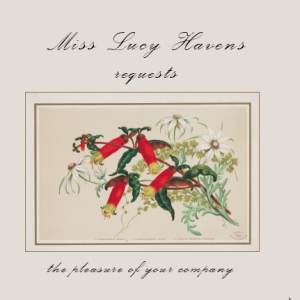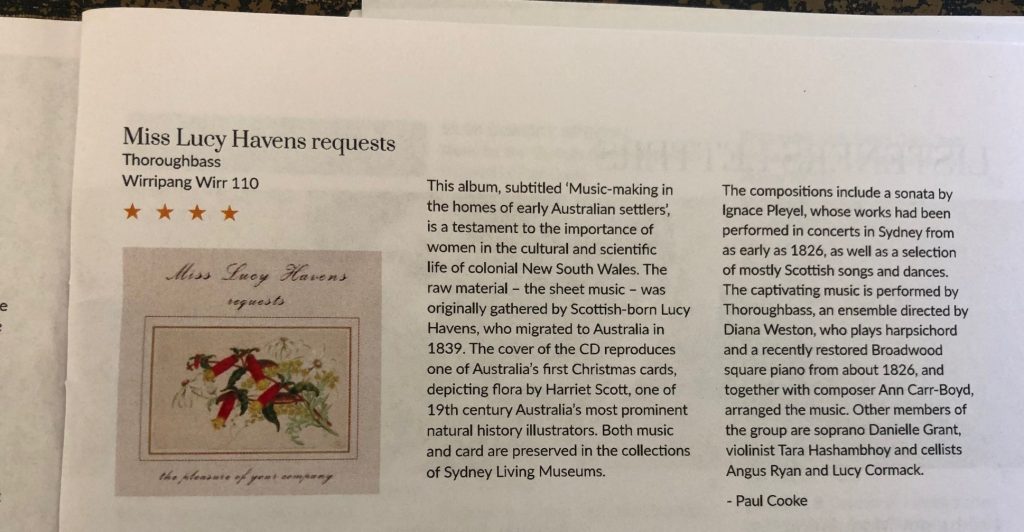
Review by Jennifer Foong, Classikon June 2021
Neville Olliffe, Early Music Association, May 2021
Miss Lucy Havens requests…. Danielle Grant, soprano; Tara Hashambhoy, violin; Angus Ryan & Lucy Cormack, celli; Diana Weston, square piano & harpsichord. Wirripang CD, WIR 110
Note…. The setting for this disk is outside the EMA’s adopted timeframe for Early Music. Our interest and comment lies in the uncovering of our own musical history in the early years of settlement.
The full title, “Miss Lucy Havens requests the pleasure of your company,” and the content description, “Music making in the homes of early Australian settlers,” suitably sets the scene for the disk.
Miss Lucy Havens was born in Scotland in 1804 and migrated to Sydney with her family in 1839. How serious a musician was Miss Havens is unclear but her surviving printed music collection of around 2,500 items has a piano focus which, in her circumstances, was the square piano, the popular instrument used by well-to-do ladies of the colony for both personal enjoyment and home entertainment. Her collection, now in the safe keeping of Sydney Living Museums, is a valuable indicator of the music that would have been imported at the time. Piano works and sonatas, plus songs and dances with a noticeable Celtic affection, form the bulk of the collection.
The disk opens with Sonata in G Major from ‘Six Sonatas for the Piano Forte or Harpsichord with an Accompaniment for a Flute or Violin and Violincello’ by Austrian, Ignace (Ignaz) Pleyel (1757-1831), a popular composer whose music was accessible, melodic and practical where resources were limited. In this affectionate performance, piano and violin deliver flowing Allegro and Allegro Molto movements around a serious but lovely Adagio.
‘An Admired Scottish Air arranged with variations for the Piano Forte’ by John Ross, and later, ‘Three short waltzes from Collection of Waltzes for the Piano Forte,’ delightfully performed, and with hand integration to illustrate the Square Piano’s characteristic where the farther ends of the keyboard represent separate instruments.
A medley of Gaelic dances involve three tracks with strings beckoning us to skip to Reels, march to Strathspeys, then waltz, and Rope Dance.
Four ‘Scotch Songs’ here performed, were enhanced with violin obbligato by local composer, Ann Carr-Boyd. Up in the morning early, Gloomy Winter’s now awa’, Within a mile of Edinburgh, and Robin Adair are a sampling of the vocal music that would have been imported at the time. The songs are rendered with attention to vocal ornamentation, but “period-spotters” possibly won’t be comfortable with the vocal vibrato.
As the disk winds down, the piano retires and harpsichord joins the strings and voice for a couple of selections from ‘The Gaelic Old Smuggler Hotch-Potch’. The tinge of sadness in these pieces is abruptly dispatched by a bouncing rendition of The Reel of Tulloch.
Radio Fine Music, Paul Cooke, 2021

